Search
Can Firms Be Trusted After Easing of Collusion Rules During Pandemic?
Andrew Ching, PhD
TaSi People
People

Technology and Society Initiative
Director
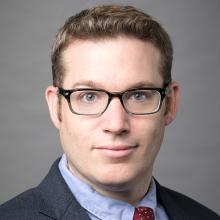
Michael Luca, PhD
Professor, Johns Hopkins Carey Business School
Michael Luca is a professor and the director of the Technology and Society Initiative at the Johns Hopkins University Carey Business School, and a faculty research fellow at the NBER. Professor Luca's research, teaching, and advisory work focuses on the design of online platforms, and on the ways in which data can inform managerial and policy decisions.
His research has been published in academic journals including the Journal of Economic Perspectives, Management Science, the Proceedings of the National Academy of Sciences, American Economic Review: Papers and Proceeding, the American Economic Journal: Applied Economics, and the American Economic Journal: Microeconomics.
He has also written about behavioral economics and online platforms for media outlets including The Wall Street Journal, Harvard Business Review, The Atlantic, Wired, and Slate. His research has been written about in a variety of media outlets including The Wall Street Journal, New York Times, New Yorker, Atlantic, Economist, Washington Post, Financial Times, Guardian, Huffington Post, Harvard Business Review, Time, USA Today, Boston Globe, LA Times, San Francisco Chronicle, Fortune, Mashable, GQ, Wired, and Vox.
Professor Luca has developed and taught materials for executive education and MBA courses on business analytics, technology, behavioral economics, and leadership.
Professor Luca's current and past advisory roles include Board Member of the National Association for Business Economics (NABE), Academic Advisory Board Member of the Behavioural Insights Team, Advisory Board Member for the OECD Digital for SMEs Global Initiative, and Advisory Board Member for the CNBC Technology Executive Council.
Faculty Affiliates

Ritu Agarwal, PhD
Wm. Polk Carey Distinguished Professor, Johns Hopkins Carey Business School
Ritu Agarwal is the Wm. Polk Carey Distinguished Professor of Information Systems and Health at the Johns Hopkins Carey Business School, and the founding co-director of the Center for Digital Health and Artificial Intelligence (CDHAI). She is an expert in the strategic use of information technology, digital transformation of health care, health analytics, and artificial intelligence applications in health.
Professor Agarwal’s research seeks to apply advanced digital technologies to health care practice and delivery, and to unravel the underlying behavioral, psychological, and social processes that enable and constrain successful health care interventions. She has been a pioneer in research related to digital technologies and health among scholars in leading business schools, and has devoted her research efforts towards improving health care quality, promoting equity and access, and reducing costs. She has published over 100 articles in leading business and health care journals such as Proceedings of the National Academy of Sciences, Information Systems Research, MIS Quarterly, Management Science, Journal of the American Medical Informatics Association, and Health Affairs.
Agarwal has testified before the National Committee on Health and Vital Statistics and the U.S. Department of Health on her research related to digital technologies and health. She is an appointed member of the Federal Advisory Council for the National Institute of Allergy and Infectious Diseases (NIAID) of the NIH and has served on the NIH Working Group for Integration of Behavioral and Social Science Research.
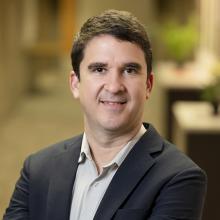
Filipe Campante, PhD
Bloomberg Distinguished Professor, Johns Hopkins Carey Business School
Filipe Campante is a Johns Hopkins University Bloomberg Distinguished Professor with appointments at Carey Business School and the School of Advanced International Studies. At SAIS, he serves as the vice dean for Faculty Affairs and Research. He is interested in political economy, development economics, and urban/regional issues. His research looks at what constrains politicians and policymakers beyond formal checks and balances: cultural norms, institutions, media, and political protest. In particular, it has focused on how these informal constraints are affected by the spatial distribution of people and economic activity, by access to information, by the evolution of cultural norms, and by the structure of the economy. He tries to answer these aggregate questions — what happens to countries or states or cities — with an applied microeconomic approach.
Campante’s work has appeared in leading academic journals such as the American Economic Review and the Quarterly Journal of Economics, among others. It has also received multiple mentions in outlets such as the New York Times, Science, NPR, Washington Post, The Economist, Los Angeles Times, Foreign Affairs, and Politico, among others. Campante is a research associate at the National Bureau of Economic Research (NBER), and was assistant and associate professor of Public Policy at Harvard from 2007 until he joined Johns Hopkins University in 2018.
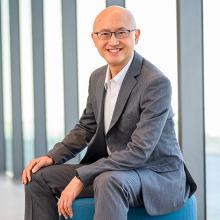
Andrew Ching, PhD
Professor, Johns Hopkins Carey Business School
Andrew Ching, PhD (University of Minnesota), is a full professor of economics at Johns Hopkins Carey Business School, and serves in a joint appointment with the Bloomberg School of Public Health. Prior to joining Johns Hopkins University, he was a full professor of marketing at the University of Toronto’s Rotman School of Management. He also had faculty appointment at Ohio State University, and visiting professor appointments at UCLA, Cornell University, University of Wisconsin-Madison, National University of Singapore, HKUST and Chinese University of Hong Kong (Distinguished Visiting Professor). In addition, he was a visiting scholar at Harvard University, Federal Reserve Bank of Boston, and Federal Reserve Bank of Kansas City. He has previously served as an associate editor for Management Science, guest associate editor for Marketing Science and Journal of Marketing Research, and a member of editorial boards for Marketing Science. He is currently serving as a member of editorial boards for Journal of Marketing Research and International Journal of Research in Marketing. His research focuses on developing new empirical structural models and estimation methods to understand the forward-looking, strategic, learning and bounded rational behavior of consumers and firms. He has applied these techniques to study the demand for prescription drugs, nursing homes, new technology adoption decisions, choice of payment methods, information spillover, late-mover advantages, video games demand, stockpiling, online support groups, and integrated marketing communication. His latest research focuses on modeling how consumers and firms adaptively learn in a dynamic world using AI and digital tools.
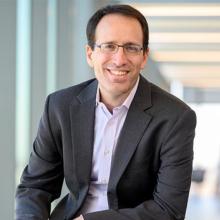
Itay Fainmesser, PhD
Associate Professor, Johns Hopkins Carey Business School
Itay Fainmesser is a professor at Johns Hopkins Carey Business School, and studies how social networks and social media affect and are affected by market activities and market rules. His current work studies the pricing of network goods, the role of intermediaries in markets, the shape and evolution of trust networks, the market for online influence, and user privacy in online platforms. His work was published in top economics and management journals such as The Review of Economic Studies, Management Science, and The Journal of Economic Theory.
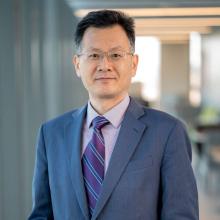
Gordon Gao, PhD
Professor, Johns Hopkins Carey Business School
Guodong (Gordon) Gao, PhD, MBA, is a professor at the Johns Hopkins Carey Business School and co-director of the Center for Digital Health and AI (CDHAI). Gao’s research interests include AI in health care, AI fairness, mHealth, and quality transparency. His research has been funded by NSF, NIH and AHRQ. Gao is dedicated to advancing AI for Health Equity education, especially for the under-resourced population and regions. He led several initiatives in the NIH-funded AIM-AHEAD program, such as the Professional Development Program, the Program for AI Readiness, and the Program for American Indian Higher Education Consortium. His work has been published at leading medical and business journals.

Wesley W. Koo, PhD
Assistant Professor, Johns Hopkins Carey Business School
Wesley W. Koo is an assistant professor in the Management & Organization area at Johns Hopkins Carey Business School. His research examines the relations between business, technology, and society. It focuses on the governance of platform ecosystems and the effects of modern technology on business and society. He has studied rural entrepreneurs' ability to navigate changing algorithms and how platform governance affects the relations between domestic workers and their employers. His research has been published in top-tier academic journals and disseminated by leading media outlets. He serves on the editorial boards at Organization Science and Strategic Management Journal. Wesley received his PhD at Stanford University, where his research was supported by the Stanford Technology Ventures Program, Stanford SEED, Accel Partners, Strategic Management Society, and Alibaba Group. Prior to Stanford, Wesley was a tech entrepreneur and received dual degrees in Environmental Engineering and Management from MIT.

Julia Levine, PhD
Assistant Professor, Johns Hopkins Carey Business School
Julia Levine is an assistant professor at Johns Hopkins Carey Business School. Her research interests lie at the intersection of marketing and public policy. She studies how people's past choices impact their current choices, both in the case of brand loyalty and category-level consumption. She examines these dynamics in policy-relevant contexts, including demand for addictive goods and nutritional inequality.
Global Immersion
Global Immersion

Student Experience
Global Immersion
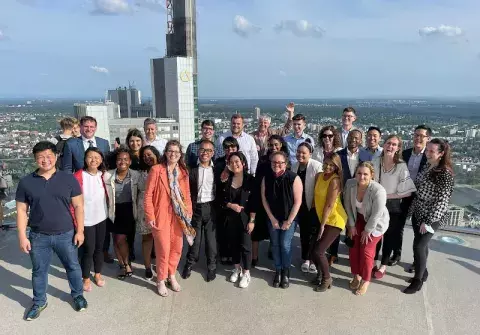
The Global Immersion program embeds students within foreign markets, exposing them firsthand to the most pressing challenges facing international businesses. These seven-day travel courses take students out of the classroom and into the heart of today’s biggest business questions, such as global health, Brexit, and the impact of technology in business, and more.
Typically held during the January Intersession, Spring Break, start of Summer term, or at the end of Summer term, Global Immersion is an intense, one-week, two-credit course, with some engagements held at a university abroad. Classroom work is supplemented with on-site visits to government offices and corporate partners. Students collaborate with business leaders to examine a particular industry problem from the businesses’ perspective. Students learn firsthand how businesses are adapting to emerging political developments and how political outcomes impact business decisions and strategy. Topics include technology, financial systems, health care systems, innovation, sustainability, and organizational management strategies, and social impact.
For students interested in a global immersion without the travel component, the Virtual Global Immersion is an opportunity to work on an international business challenge with graduate business students from an overseas partner institution. The 8-week Virtual Global Immersion is a cross-cultural collaboration that takes place entirely online via synchronous class sessions. These weekly synchronous sessions incorporate faculty lectures from each institution, cultural activities, virtual business site visits, and group project work to give students a truly international educational experience in which they learn firsthand from one another about the business culture in each of their respective countries.
Global Immersion Offerings
Chile—Business in Latin America: (BU.003.903.91)
Join us for a seven-day travel course examining business in Chile. Students will gain insight into Latin American business trends and opportunities. With a focus on sustainability and innovation, students will meet with government agencies, corporate businesses, and academic institutions to gain varied perspectives on Chile’s business and economy.
Date: January Intersession
Location: Santiago, Chile
Faculty: Luis Quintero, PhD
To participate in the Chile Global Immersion, students need to be prepared to graduate no earlier than the Spring term. Registration for January Intersession courses opens in April.
Virtual Global Immersion: Peru - Cross-Cultural Teaming on Business Challenges (BU.003.930.41)
In this eight-week Virtual Global Immersion, graduate students from both Carey and CENTRUM Pontificia Universidad Católica del Perú (PUCP) work together in cross-cultural teams on an international business challenge. At the start the course, the students from each school are introduced to their teammates and learn about the scope of the real-world business challenges they will tackle together. In preparation for their collaboration, the students are guided through effective multicultural team-building principles to create a team contract and develop their project work plan. Over the following weeks the students explore the variances between their respective countries’ business environments and share their own perspectives about the project topic. Lectures are delivered by faculty from each academic institution. Weekly synchronous class sessions include virtual business site visits, workshops, expert panels, and cultural enrichment activities to complement the intensive team project work.
Date: Spring, Term 1 (January - March)
Location: Online
Faculty: James Calvin, PhD
To participate in the Virtual Peru Global Immersion, students need to be prepared to graduate no earlier than the Spring term. Registration for Spring I courses opens in November.
Italy—Health Care in Europe: Models, Regulation & Business (BU.003.904.91)
In this global immersion, students will gain insights into European health care models and will analyze similarities and differences with U.S. models. They will explore the diverse landscape of public and private health care models in Europe, understand the regulatory aspects (both at the country and EU levels), and become acquainted with the business dynamics within the health care sector. Drawing from varied perspectives, such as government agencies, corporate businesses, health care providers and clinics, and/or academic institutions, students will develop a well-rounded view of different health care models in Europe. This course includes two pre-departure lectures (accessible remotely), with a week-long travel component in Milan, Italy (including a day-trip to Bologna).
Date: Spring Break
Location: Milan, Italy
Faculty: Mario Macis, PhD
To participate in the Italy Global Immersion, students need to be prepared to graduate no earlier than the Spring term. Registration for Spring I courses opens in November. Note that required travel for the Spring Break Immersion may conflict with some Spring 1 final exams.
UK—Technology & Society through a Behavioral Economics Lens (BU.003.906.91)
Does social media make us happier? Are hidden fees exploitative? Can online marketplaces mitigate discrimination? Using a behavioral economics lens, this course will explore how technology platforms impact our wellbeing. Through interactive panels, discussions, and hands-on project work, you will learn to apply insights from behavioral economics to understand and improve technology's societal implications. We will connect with tech companies, consulting firms, entrepreneurs, and policy leaders; with the UK Behavioural Insights Team – a leading behavioral policy organization – as a key course partner. Students are expected to actively participate throughout the course, to contribute to a thoughtful learning experience for the class as a whole, and to complete a group project during the trip proposing changes to a product or policy based on behavioral economics principles to enhance societal wellbeing. This course includes two pre-departure lectures (accessible remotely), with a week-long travel component in London, United Kingdom
Date: Spring Break
Location: London, United Kingdom
Faculty: Michael Luca, PhD
To participate in the UK Global Immersion, students need to be prepared to graduate no earlier than the Spring term. Registration for Spring I courses opens in November. Note that required travel for the Spring Break Immersion may conflict with some Spring 1 final exams.
Germany: Finance and Fintech in the EU (BU.003.911.91 & BU.003.916.91)
This course is offered to Carey Business School students interested in learning more about European financial markets, including the local fintech industry. It aims to develop in-depth knowledge of the European financial system through a partnership with the Frankfurt School of Finance and Management (FSFM). Both Carey Business School faculty and FSFM professors will provide classes on the history and current status of the financial system in Europe and compare those systems to the U.S. financial landscape. Activities will also be aimed at local fintech and startup industries. Corporate and government organization visits will complement lectures and case studies.
Date: Late May (Week after Spring II finals)
Location: Frankfurt School of Finance and Management (FSFM)
Faculty: Yuval Bar-Or, PhD
This course consists of two 1-credit co-requisites: BU.003.911.91 (1 credit) in Spring II and BU.003.916.91 (1 credit) in Summer.
To participate in the Germany Global Immersion, students need to be prepared to graduate no earlier than the Summer term. Registration for Spring II courses opens in November.
United Kingdom—Navigating Strategic Crises (BU.003.900.91)
Whether financial collapse, public health emergencies, infrastructure failure, or geopolitical tension, business leaders across all industries face a variety of risks that can quickly evolve into crises. Using recent events in both the United Kingdom and continental Europe as case studies, students in this course will sharpen their skills to manage effectively through a wide variety of challenging business situations. This immersion will consist of on-site visits and lectures with government agencies and corporate partners examining the UK’s finance, health care, and logistics industries. This course is open to 30 students.
Date: Late July (Week after Summer finals)
Location: London, United Kingdom
Faculty: Rick Smith, PhD
To participate in the United Kingdom Global Immersion, students need to be prepared to graduate no earlier than the Summer term. Registration for summer immersions open in March.
Peru—Community and Societal Impact (BU.003.907.91)
In this global immersion, students will gain insights into issues of international social and environmental impact, aligning with the United Nations’ 17 Sustainable Development Goals. The course aims to empower students to create positive changes in local businesses and communities while examining the role of social impact work in Peru. Students from Johns Hopkins Carey Business School will attend two synchronous, virtual pre-departure lecture sessions to begin working together on team projects related to community and social impact. Then they will travel to Lima, Peru, between Sunday, 3 August, to Saturday, 9 August 2025, to continue their project group work in person and to attend lectures with faculty from CENTRUM Pontificia Universidad Católica Del Perú (PUCP) Graduate Business School. They will also gain varied perspectives through site visits and presentations from government agencies, nonprofit organizations, and local businesses.
Date: Early August
Location: Lima, Peru
Faculty: James Calvin, PhD
To participate in the Peru Global Immersion, students need to be prepared to graduate no earlier than the Summer term. Registration for summer immersions open in March.
Navigating Innovation in India (BU.003.908.91)
This course offers students an immersive experience in India, a dynamic and rapidly growing economy. Students will explore the Indian innovation ecosystem, gaining insights into the unique consumer preferences, cultural nuances, and business practices that drive success in this diverse market. Through incubator and customer visits, guest lectures, and hands-on activities, students will deepen their understanding of how to navigate the complexities of doing business in India. The course culminates in an entrepreneurship challenge where students will pitch a startup idea—either a novel concept or an adaptation of a successful US model tailored to the Indian market. This experience will equip students with the knowledge and skills needed to thrive in a global business environment, particularly within the context of emerging markets.
Date: January Intersession (starting in 2026)
Location: Hyderabad, India
Faculty: Supriya Munshaw, PhD
To participate in the India Global Immersion, students need to be prepared to graduate no earlier than the Spring term. Registration for January Intersession courses opens in April. This course is intended to be offered every other year (next offered in January 2028).
Eligibility
To participate in these courses, students must be currently enrolled as a graduate student at Johns Hopkins Carey Business School with a minimum GPA of 3.0 and have completed 12 credits.*
*The 12-credit requirement can be waived, per course faculty approval, if students demonstrate significant industry experience in the subject matter or international business.
Enrollment varies per program, but is generally limited to 26 students with a minimum of 20 students. Tuition, international residency fees, and nonrefundable deposit are applicable to all students, regardless of status.